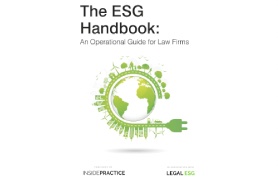As the global focus on Environmental, Social, and Governance (ESG) issues continues to grow, the legal sector plays a critical role in driving change and promoting responsible business practices.
With clients placing increasing emphasis on sustainability and ethical governance, it’s essential for law firms to not only provide informed guidance but also demonstrate their own commitment to ESG principles.
We are excited to announce the launch of our new book The ESG Handbook: An Operational Guide for Law Firms
This comprehensive guide is designed to empower law firms and lawyers to integrate ESG strategies into their operations and lead by example in the legal profession.
Some of the key areas covered in The ESG Handbook include:
- Developing and implementing an ESG strategy for your firm
- Navigating the complex landscape of ESG frameworks and reporting standards
- Reducing your firm’s environmental footprint through sustainable practices
- Championing diversity, inclusion, and employment standards for a thriving workplace
- Establishing robust governance structures and promoting transparency in decision-making
OVERVIEW
The ESG Handbook provides insights into the ESG journeys of 20 leading law firms, including the likes of:
- Bryan Cave Leighton Paisner
- Burges Salmon
- Clifford Chance
- Freshfields Bruckhaus Deringer
- Linklaters
- Macfarlanes
- Pinsent Masons
- Shoosmiths
- Slaughter and May
Drawing on these real-world examples and industry best practices, this handbook offers practical insights and actionable steps to help your firm embrace ESG principles and stay ahead of the curve.
By adopting a comprehensive ESG strategy, your firm can not only better serve its clients but also attract top talent and ensure long-term success.
Don’t miss the opportunity to transform your practice and enhance your firm’s reputation as an ESG leader in the legal sector.
Pre-order your copy of The ESG Handbook: An Operational Guide for Law Firms today.
Format: eBook
Pages: 118
Publish Date: June 16th
FOREWARD
In recent years, Environmental, Social, and Governance (ESG) considerations have become increasingly important in the corporate world.
As a result, companies and organizations have sought the guidance of law firms to help them navigate the complex landscape of ESG regulations and best practices. However, while many law firms recognize the value of advising their clients on these critical issues, they often overlook the need to incorporate ESG principles within their own practices.
In a 2022 report by the RSGI, a global think-tank for the legal industry, nearly half (49%) of the top 100 firms by revenue have formal ESG practices, but only 17% publish an ESG report and just under a fifth have set carbon emissions reduction targets.
This book, “The ESG Handbook: An Operational Guide for Law Firms,” is designed to bridge that gap and empower law firms to integrate ESG strategies into their operations.
The legal profession, as a critical driver of corporate and societal change, has a responsibility to lead by example.
With clients placing increasing emphasis on sustainability, social responsibility, and ethical governance, law firms must not only provide informed guidance but also demonstrate their own commitment to these values. By adopting a comprehensive ESG strategy, law firms can better serve their clients, attract top talent, and promote their own long-term success.
This book aims to provide a practical guide for law firms looking to develop and implement their own ESG strategy.
Drawing on real-world examples and industry best practices, we will explore the challenges and opportunities law firms face in the ESG landscape.
The chapters are designed to address key aspects of ESG, including:
- Your ESG strategy: Steps to make ESG an integral part of your business strategy
- Understanding ESG frameworks: What they mean for your firm
- Environmental considerations: Reducing the firm’s environmental footprint and promoting sustainable practices.
- Social considerations: Diversity, inclusion and employment standards
- Governance considerations: Establishing robust governance structures and promoting transparency in decision-making
CONTENTS
1. Your ESG strategy
1.1 Prioritise ESG issues
1.2 Assess your current ESG performance
1.3 Define your ESG goals
1.4 Gap analysis
1.5 Develop ESG policies and programmes
1.6 Key performance indicators and metrics
1.7 Report on ESG performance
1.8 Continuously improve your ESG strategy
-
2. Understanding ESG Frameworks
-
3. Environmental considerations
-
4. Social considerations: Diversity, inclusion and employment standards
-
5. Governance considerations
-
Annex – Additional ESG Frameworks




